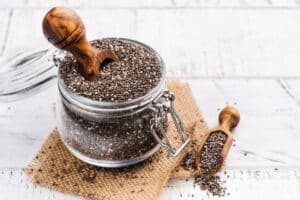Do you stay up late finishing work, returning emails, surfing the net, or watching TV? Burning the midnight oil can lead to sleep deprivation, which increases our risk of obesity, diabetes, hypertension, heart disease, brain fog, and even early death. The latest research suggests that too little sleep not only affects how much we eat but also what we eat, making it difficult to lose weight or keep weight off. We can make little changes to improve our sleep and weight loss.
Women in their prime often find that it takes longer to fall asleep and remain asleep throughout the night. Fortunately, these general sleep difficulties associated with aging can be mitigated by incorporating simple behavioral and dietary changes into our daily routine.
Sleep and Weight Loss: How sleep deprivation affects your body
It interferes with hormones: Not getting enough sleep throws off the hormones in our bodies that influence our appetite. Specifically, it causes an increase in the hormone ghrelin stimulates our appetite, and a decrease in the hormone leptin that signals satiety. Consequently, we often eat more after dinner. Unfortunately, we become more insulin-resistant in the late evening, which causes these additional calories to be stored as fat.
It changes food preferences: Studies also show that a lack of sleep causes us to crave high-carbohydrate, high-fat foods. These are the same foods that promote weight gain, high cholesterol levels, and insulin resistance.
It alters fat cells: After just 4 days of too little sleep, research shows that our fat cells become more insulin resistant – a metabolic change associated with obesity and diabetes. Both of which increase our risk of heart disease and hypertension.

\What you can do to improve your sleep habits:
Avoid watching TV or spending time on smartphones, computers, and iPads an hour before bedtime. These light-emitting screens can suppress the release of the sleep-promoting hormone melatonin.
Establish a relaxing, consistent bedtime routine: Allow an hour of time in dim light to unwind and relax before going to bed. Read, take a bath, or simply get organized for the next day. Relaxation exercises can be beneficial, too. Go to bed and get up each day at the same time. Establishing a consistent schedule will help train the body to fall asleep and wake up more easily.
Exercise during the day: Physically active people sleep better than those who are sedentary. Exercising vigorously at night can interfere with falling asleep, so work out during the morning or daytime hours.
Keep a pad of paper by the bedside: If you often wake up thinking of things you need to do the next day, quickly jot them down so you won’t forget them. It will quiet the mind and help you fall back asleep.
Limit or reduce caffeine intake: This is a big one! Caffeine can stay in the body for up to 8 hours, leading to sleep and weight loss disturbances well into the night. Assess how much tea, coffee, soda, and chocolate you consume daily. Cut back and avoid all caffeine after 2 PM. (FYI, over-the-counter medications such as pain relievers, cold remedies, and diet pills can also contain substantial amounts of caffeine.)
Avoid nightcaps: Alcohol in the evening can help one fall asleep, but later in the night, it can act like a stimulant and interrupt sleep and weight loss.
Nap early, if at all: If you must nap, limit siestas to 20 minutes in the early afternoon.
Avoid large meals a couple of hours before bed.
Use “white noise” devices like fans to drown out surrounding noise.
Keep the bedroom cool and dark, and use it only for sleep and intimacy.
Avoid regular use of sleeping pills. Medications such as Ambien, Lunesta, Sonata, and Ativan should not be taken on a regular basis. Instead, try the above steps to improve the quality of sleep. For those who still struggle, talk to a doctor about natural sleep aids like melatonin or valerian.
Consuming certain minerals can also promote sound sleep. Try incorporating these nutrient-dense foods into your diet:

Magnesium-rich foods: Dark leafy greens, nuts, seeds, beans/lentils, halibut, tempeh, brown rice, quinoa, low/no-fat dairy, bananas, avocados, and dried fruit. Magnesium relaxes our nerves and muscles. Consuming too little of this mineral is associated with insomnia and restless leg syndrome.
Potassium-rich foods: Bananas, oranges, sweet potatoes, low or no-fat yogurt, beans, fish, avocados, dark leafy greens, winter squash, mushrooms, and tomatoes. Emerging research suggests potassium can help regulate the deepest phase of our sleep cycle.
Calcium-Rich Foods: Dairy products, dark leafy greens, white beans, canned salmon with bones, sardines, oranges, broccoli, almonds, sesame seeds, fortified juices, non-dairy milk, and soy products. Calcium aids in the production of melatonin, our primary sleep-promoting hormone.
Sleep on this: There isn’t a miracle cure for getting a good night’s sleep, but implementing the tips above will surely help and give you the best chance of achieving and maintaining a healthy weight and a life free of chronic disease.








